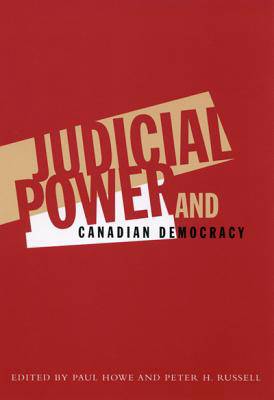
Bedankt voor het vertrouwen het afgelopen jaar! Om jou te bedanken bieden we GRATIS verzending (in België) aan op alles gedurende de hele maand januari.
- Afhalen na 1 uur in een winkel met voorraad
- In januari gratis thuislevering in België
- Ruim aanbod met 7 miljoen producten
Bedankt voor het vertrouwen het afgelopen jaar! Om jou te bedanken bieden we GRATIS verzending (in België) aan op alles gedurende de hele maand januari.
- Afhalen na 1 uur in een winkel met voorraad
- In januari gratis thuislevering in België
- Ruim aanbod met 7 miljoen producten
Zoeken
€ 51,95
+ 103 punten
Omschrijving
The controversy raises challenging questions about the role of a powerful judiciary in a democracy. In Judicial Power and Canadian Democracy, a series of essays commissioned by the Institute for Research on Public Policy, some of Canada's foremost commentators - academics, politicians, and Supreme Court judges themselves - take up the debate. Some tangle over the pivotal question: should judges have the decisive say on issues involving entrenched rights that have profound implication for the policy preferences of elected bodies? Others examine related issues, including Supreme Court appointment procedures, interest group litigation, the historical roots of the notwithstanding clause, and the state of public opinion on Canada's courts. Those interested in the power of the judicial branch will find much in this collection to stimulate fresh thinking on issues that are likely to remain on the public agenda for years to come. Contributors include Joseph F. Fletcher (Toronto), Janet Hiebert (Queen's), Gregory Hein (Toronto), Peter W. Hogg (York), Paul Howe, Rainer Knopff (Calgary), Sébastien Lebel-Grenier (Sherbrooke), Howard Leeson (Regina), Kate Malleson (London School of Economics), E. Preston Manning (Reform Party of Canada), Hon. Beverley McLachlin (Supreme Court of Canada), F.L. Morton (Calgary), Pierre Patenaude (Sherbrooke), Peter Russell, Allison A. Thornton (Blake, Cassels and Graydon), Frederick Vaughan (emeritus, Guelph), Lorraine Eisenstat Weinrib (Toronto), Hon. Bertha Wilson (emeritus, Supreme Court of Canada), and Jacob Ziegel (Toronto).
Specificaties
Betrokkenen
- Auteur(s):
- Uitgeverij:
Inhoud
- Aantal bladzijden:
- 352
- Taal:
- Engels
Eigenschappen
- Productcode (EAN):
- 9780773522251
- Verschijningsdatum:
- 9/01/2001
- Uitvoering:
- Paperback
- Formaat:
- Trade paperback (VS)
- Afmetingen:
- 160 mm x 228 mm
- Gewicht:
- 512 g

Alleen bij Standaard Boekhandel
+ 103 punten op je klantenkaart van Standaard Boekhandel
Beoordelingen
We publiceren alleen reviews die voldoen aan de voorwaarden voor reviews. Bekijk onze voorwaarden voor reviews.









